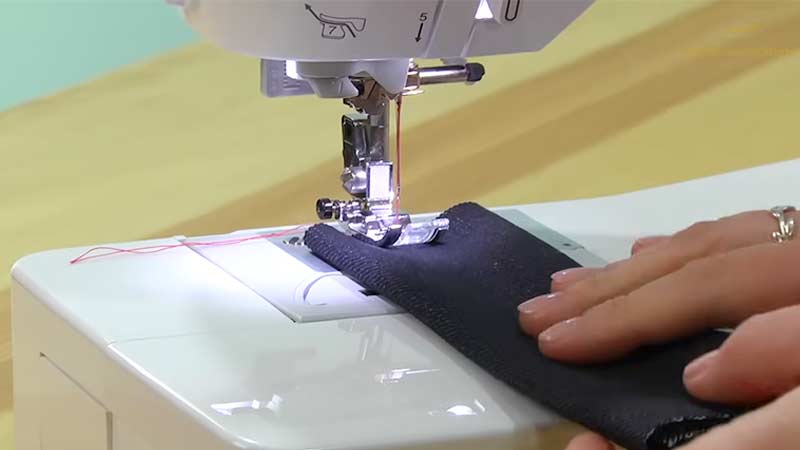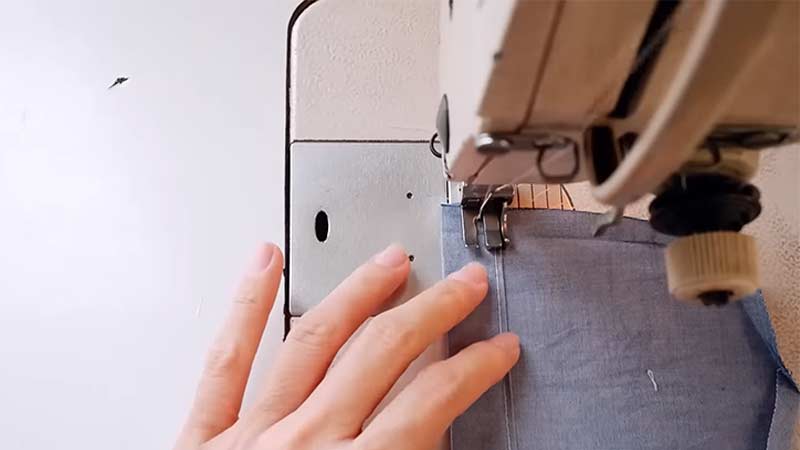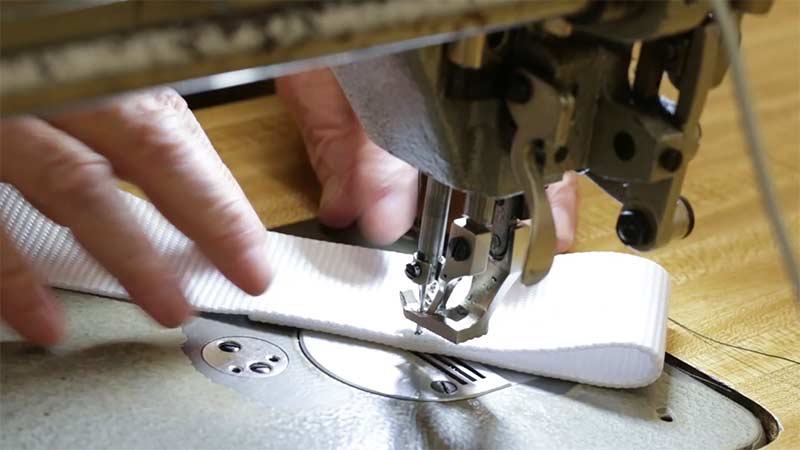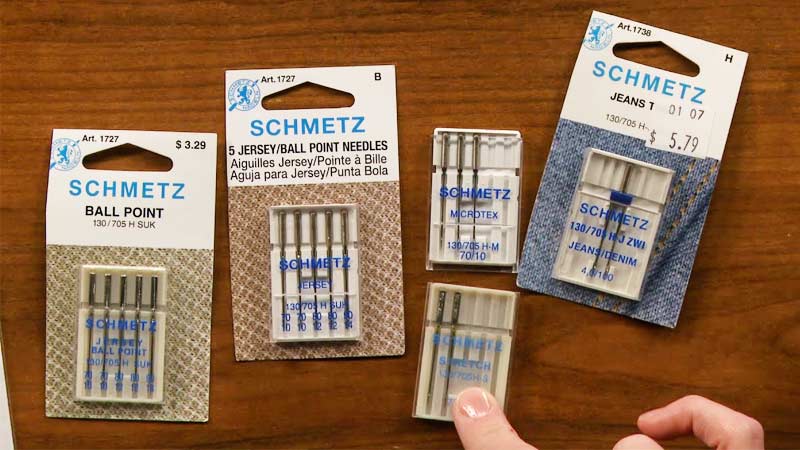Embarking on sewing projects involving thick nylon fabrics demands careful consideration of the needles used for optimal results.
Choosing the suitable needles is essential for achieving seamless stitches, ensuring the durability and aesthetic appeal of the final product.
The question “What needles to use for sewing thick nylon?” becomes pivotal in successful sewing endeavors. In this exploration, we delve into various needle options and considerations tailored to the challenges posed by thick nylon textiles.
Understanding the nuances of needle selection ensures that the sewing process is efficient and effective and yields professional-quality outcomes.

What Needles To Use For Sewing Thick Nylon?
Choosing needles is pivotal for success when tackling the robust task of sewing thick nylon webbing. Each needle type serves a specific purpose, ensuring efficient stitching without compromising the integrity of the material.
Let’s explore seven kinds of needles ideally suited for sewing nylon webbing.
Heavy-Duty Machine Needles
Opt for heavy-duty machine needles for sewing thick nylon webbing with a machine. These needles are designed with a reinforced shaft to penetrate dense materials, ensuring smooth and sturdy stitching.
Denim Needles
Renowned for their strength, denim needles are excellent for sewing thick nylon webbing. The firm shaft easily pierces through multiple layers, making it a reliable choice for heavy-duty projects.
Upholstery Needles
Crafted explicitly for sewing through rigid materials, upholstery needles are well-suited for nylon webbing. Their durability and thick construction make them adept at handling heavy fabrics.
Leather Needles
Leather needles possess a chisel point, making them practical for sewing thick nylon webbing. Their sharp tips penetrate tough fabrics, ensuring secure and long-lasting seams.
Ballpoint Needles
Ideal for stretch fabrics, ballpoint needles work well with nylon webbing due to their rounded tip. This design prevents snags and ensures a smooth sewing experience on this resilient material.
Triple Needles
Triple needles consist of three needles on a single shaft, enabling simultaneous stitching of multiple rows. This makes them efficient for sewing thick nylon webbing, enhancing speed and precision.
Size 18/110 Universal Needles
Size 18/110 universal needles are more prominent and sturdier, making them suitable for sewing thick nylon webbing. Their versatility allows use on various fabrics, ensuring a reliable stitch on dense materials.
Selecting the appropriate needle for sewing thick nylon webbing ensures your projects are efficient and durable.
Whether using a heavy-duty machine needle, denim needle, or upholstery needle, the right choice contributes to the success of your heavy-duty sewing endeavors.
How To Use Sewing Machine Needle For Nylon Fabric?

Sewing thick nylon fabric demands precision and the proper techniques, especially when using a sewing machine. Employing a thick sewing needle designed for the task is crucial for smooth and efficient stitching.
Let’s explore seven simple methods for effectively using a sewing machine needle on thick nylon fabric.
Select the Right Needle Size
Begin by choosing an appropriate needle size, such as 18/110 or larger, to accommodate the density of thick nylon fabric. This ensures the needle can easily pierce through the material without causing snags or skipped stitches.
Use a Heavy-Duty Needle
Opt for a heavy-duty or denim needle designed to handle the challenges of thick fabrics like nylon. These needles have a reinforced shaft that can withstand the resistance presented by dense materials.
Check Needle Compatibility
Ensure the needle you choose is compatible with your sewing machine model. Different machines may require specific needle types, and using the correct needle ensures optimal performance.
Adjust Thread Tension
Experiment with thread tension settings to find the right balance for sewing thick nylon fabric. Too much tension may result in puckering, while too little can lead to loose stitches. Test on a scrap piece before starting your project.
Go Slow and Steady
Sewing thick nylon fabric requires a slower sewing speed to allow the needle to penetrate smoothly. Gradual and steady stitching minimizes the risk of needle breakage and ensures a consistent seam.
Consider a Walking Foot Attachment
Attach a walking foot to your sewing machine, especially when dealing with multiple layers of thick nylon fabric. This attachment helps feed the fabric evenly, preventing uneven stitching and ensuring a neat finish.
Use Proper Stitch Length
Adjust the stitch length to a slightly longer setting. This prevents the needle from punching too many holes in the fabric, reducing the risk of tearing or weakening the dense nylon material.
Mastering the art of sewing thick nylon fabric with a sewing machine requires attention to detail and a suitable thick sewing needle.
By following these simple methods, you can achieve professional-looking results while ensuring the longevity of your sewn projects.
What Size Needle For Sewing Nylon Webbing?

When sewing robust materials like nylon webbing, using the correct needle is crucial for achieving clean and sturdy stitches. Selecting an appropriate needle size ensures that your sewing machine can efficiently handle the density of the material.
Let’s explore seven kinds of needles, including thick sewing needles, specifically suitable for sewing nylon webbing.
Size 18/110 Universal Needles
These needles are optimal for handling thick fabrics like nylon webbing and have a larger size and sturdy construction. Their versatility allows for efficient stitching on various materials, providing reliability and durability.
Heavy-Duty Needles
Designed explicitly for heavy fabrics, heavy-duty needles are well-suited for sewing through the density of nylon webbing. Their reinforced shaft can withstand the resistance posed by robust materials, ensuring smooth sewing.
Denim Needles
Renowned for their strength, denim needles are suitable for nylon webbing. Their robust build and sharp point make them adept at piercing through multiple layers, providing a reliable and neat finish.
Upholstery Needles
Upholstery needles are crafted for handling rigid materials and are excellent for sewing nylon webbing. Their durability and thickness make them reliable for heavy-duty projects, ensuring long-lasting and secure seams.
Topstitch Needles
Topstitch needles have a giant eye, making them suitable for thicker threads commonly used in sewing nylon webbing. Their design allows easy threading and efficient sewing, enhancing the overall stitching experience.
Sailmaker’s Needles
Sailmaker’s needles are designed for sewing through heavy fabrics, making them ideal for nylon webbing. Their triangular point ensures easy penetration, providing precision in stitching even the most rigid materials.
Triple Needles
Featuring three needles on a single shaft, triple needles are efficient for the simultaneous stitching of multiple rows on nylon webbing. This design enhances speed and precision, making them suitable for heavy-duty projects.
Choosing the correct needle size is crucial for successful sewing of nylon webbing. Whether opting for size 18/110 universal needles, heavy-duty denim, upholstery, topstitch, sailmakers, or triple needles.
The correct choice ensures that your sewing machine can handle the density of the material while providing a professional and durable finish.
Several Ways to Choose Sewing Machine Needle For Thick Fabric

Selecting the appropriate sewing machine needle for thick fabric, such as sewing nylon, is crucial to ensure smooth and effective stitching. Different fabrics require specific needle types and sizes to accommodate their density.
Here are several ways to choose the right sewing machine needle for thick fabrics:
Consider Fabric Type
Start by identifying the type of thick fabric, like nylon, you’ll be working with. Different fabrics have varying densities and characteristics; choosing a needle based on the fabric type ensures compatibility.
Understand Needle Sizes
Please pay attention to needle sizes, as they indicate the thickness and strength of the needle. For sewing thick fabrics like nylon, opt for larger needle sizes, such as 16/100 or 18/110, to accommodate the material’s density.
Select Needle Type
Choose a needle type that suits the specific needs of thick fabrics. For sewing nylon, consider using a heavy-duty or denim needle. These needles have a reinforced shaft designed to handle the resistance posed by robust materials.
Evaluate Needle Point
The needlepoint plays a crucial role in penetrating thick fabrics. For nylon, a needle with a sharp point, like a universal or denim needle, is ideal for efficient stitching without causing snags or skipped stitches.
Adjust Needle Thickness
Adjust the needle thickness based on the layers of fabric you’ll be sewing. For multiple layers of thick nylon, a thicker needle provides the necessary strength and durability for seamless stitching.
Experiment with Needle Coatings
Some needles come with coatings like titanium or chrome, which reduce friction and enhance durability. Experimenting with coated needles can improve the overall sewing experience when working with thick fabrics like nylon.
Test on Scrap Fabric
Before starting your project, test the chosen needle on a scrap piece of the same fabric. This allows you to observe how the needle performs and ensures that it can handle the thickness of the material without causing issues.
Consider Specialized Needles
In some cases, specialized needles such as topstitch or quilting needles may be suitable for thick fabrics. These needles often have features that make them adept at handling dense materials like nylon.
By considering fabric type, understanding needle sizes, selecting the right needle type, evaluating needlepoint, adjusting the thickness, experimenting with coatings, testing on scrap fabric, and considering specialized needles.
You can confidently choose the ideal sewing machine needle for sewing nylon and other thick fabrics, ensuring professional and durable results.
FAQs
Can I use universal needles for thick nylon fabrics?
While universal needles can work, choosing needles explicitly designed for heavy fabrics, such as denim or heavy-duty needles, is advisable. These specialized needles provide better penetration and durability.
Are there specific needle sizes recommended for thick nylon?
Opt for larger needle sizes, such as 16/100 or 18/110, when sewing thick nylon. These sizes accommodate the material’s density, ensuring effective and reliable stitching.
Can coated needles enhance the sewing experience with thick nylon?
Yes, coated needles, such as titanium or chrome-coated ones, reduce friction and enhance durability. Experimenting with coated needles can improve the sewing experience on thick nylon fabrics.
Should I test the needle on scrap fabric before sewing thick nylon?
Testing the chosen needle on a scrap piece of thick nylon fabric is advisable. This helps assess the needle’s performance and ensures it can handle the material without issues.
Are there specialized needles like topstitch needles suitable for thick nylon?
Specialized needles like topstitch or quilting needles can be suitable for thick nylon fabrics. These needles often have features that make them adept at handling dense materials, providing efficient and precise stitching.
Conclusion
The choice of needles for sewing thick nylon significantly impacts the overall success of the sewing project.
From heavy-duty needles designed for robust fabrics to denim needles renowned for their strength, the selection process involves considering the fabric’s characteristics and the project’s specific demands.
Experimenting with needle sizes, types, and coatings allows for a customized approach, ensuring smooth stitching without compromising the integrity of the thick nylon material.
By making informed decisions on what needles to use, sewers can confidently tackle projects involving thick nylon fabrics, achieving precision and durability in their creations.
Leave a Reply